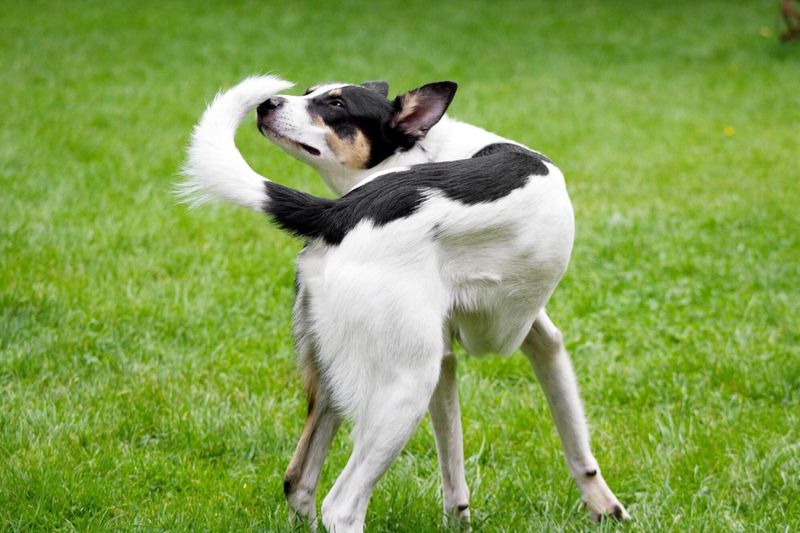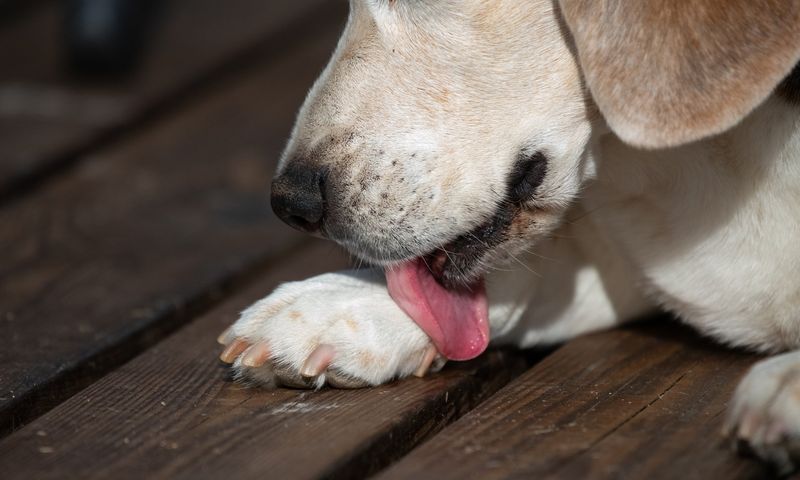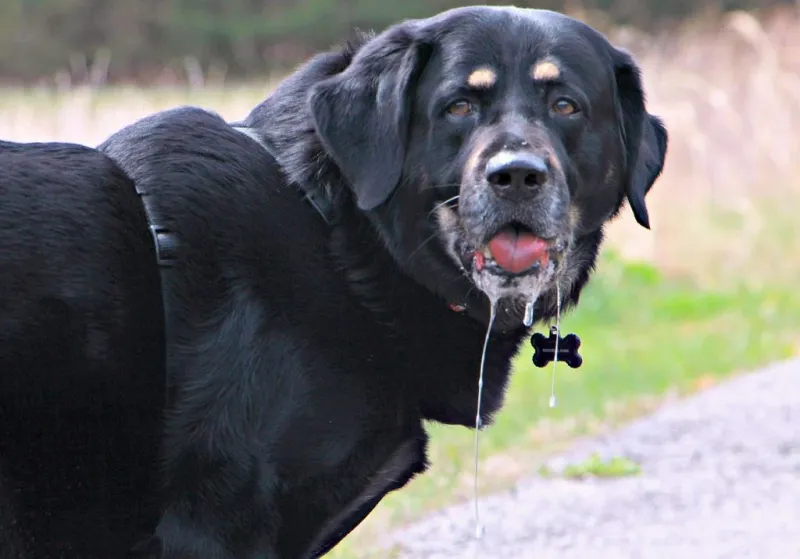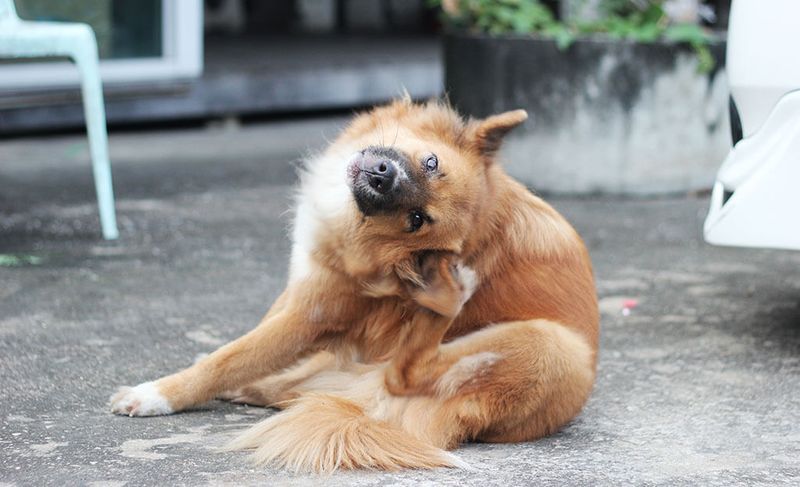Dogs have a knack for charming us with their quirky behaviors, but sometimes these adorable antics can hint at underlying health issues. By understanding these signals, we can ensure our furry companions remain in the best of health. Here’s a closer look at 13 delightful habits that might be concealing more than meets the eye.
Excessive Tail Chasing
Tail chasing might seem like a hilarious way for dogs to entertain themselves, but if this habit becomes excessive, it could be signaling a health issue. One possibility is an underlying neurological disorder or even obsessive-compulsive behavior. Dogs who chase their tails excessively might also be dealing with anxiety or stress, particularly if they engage in the behavior when left alone. Additionally, it could indicate a flea infestation causing itchiness in the tail area. Ensuring your pet is flea-free and observing their behavior can help identify the root cause. Regular vet check-ups can provide reassurance and keep your dog happy.
Frequent Head Tilting
The adorable head tilt that many dogs exhibit can be endearing, making them look inquisitive and attentive. However, frequent head tilting could suggest an issue with their ears or balance. It may point to a condition known as vestibular disease, affecting a dog’s inner ear and balance system. Alternatively, it could be due to an ear infection or a buildup of wax. Owners should monitor for other symptoms such as ear scratching or discharge. Timely veterinary intervention can rule out serious conditions and ensure your pup’s ears remain healthy.
Excessive Paw Licking
Paw licking is a common behavior among dogs, but when it becomes excessive, it may indicate an underlying problem. This habit can be a sign of allergies, either environmental or food-related, causing itchy paws. Anxiety or stress can also manifest through constant paw licking, as dogs soothe themselves. Furthermore, it might hint at pain from an injury or foreign object stuck in the paw. Checking your dog’s paws regularly and consulting with a vet if the behavior persists can help identify the issue, ensuring your pet’s comfort and well-being.
Sudden Snoring
While some dogs naturally snore, sudden changes in snoring patterns could hint at an underlying health issue. Breeds with short noses, like Bulldogs, are prone to snoring due to their anatomy. However, if a typically quiet dog starts snoring loudly, it could be due to obesity, respiratory infections, or allergies. This change might also suggest obstructive sleep apnea, a condition needing veterinary attention. Observing your dog’s sleeping habits and ensuring they maintain a healthy weight can prevent snoring-related problems and promote restful sleep.
Unusual Eating Habits
Changes in eating habits can be a red flag for dog owners. If your dog is suddenly eating more or less than usual, it might indicate an underlying health issue such as dental problems, digestive disorders, or even anxiety. Sudden dietary changes can also signal thyroid issues or diabetes. It’s essential to monitor your pet’s food intake and consult a veterinarian if the behavior persists. By identifying these early signs, you can ensure your dog’s dietary health remains optimal and address any potential issues before they escalate.
Persistent Itching
While occasional itching is normal for dogs, persistent scratching can indicate an underlying health problem. This behavior might suggest allergies, which could be triggered by food, pollen, or fleas. In some cases, constant itching can also be a sign of a skin infection or parasites. Recognizing other signs, such as red or inflamed skin, can help identify the cause. Ensuring your dog is on a regular flea prevention program and consulting a vet for persistent itching can keep your dog’s skin healthy and irritation-free.
Excessive Water Drinking
Dogs generally drink more water in warm weather or after exercise, but excessive drinking can indicate a health concern. Conditions such as diabetes, kidney disease, or Cushing’s disease can lead to increased thirst. If you notice your pet drinking more than usual and urinating frequently, it’s time to consult a veterinarian. Early diagnosis can lead to effective management of these conditions, preventing further complications. Keeping track of your dog’s water consumption can provide vital insights into their overall health and well-being.
Scooting on the Floor
Scooting might look funny, but it often signals discomfort in the anal region. This behavior can indicate impacted anal glands, which require veterinary attention and possibly expression. Parasites like worms can also cause irritation, leading to scooting. Additionally, allergies affecting the skin around the rear can trigger this behavior. Observing your dog for other signs, such as licking or biting at the area, can help identify the cause. Regular check-ups and maintaining proper hygiene can prevent scooting, ensuring your dog’s comfort.
Unusual Barking Patterns
Changes in a dog’s barking patterns can be a clue to their health. If your typically quiet dog becomes overly vocal, it might signal anxiety or pain. Alternatively, if a usually barky dog becomes silent, it could indicate a throat issue or respiratory illness. Unusual barking may also be a response to sensory loss, such as hearing or vision impairment. Identifying the underlying cause with the help of a veterinarian can address potential health issues and restore harmony to your household.
Constant Face Rubbing
Face rubbing might seem like a cute quirk, but it’s often a sign of discomfort. Dogs may rub their faces to relieve pain or itchiness due to allergies or skin infections. Dental issues or problems with the eyes or ears can also lead to this behavior. Noticing if your dog is rubbing against specific surfaces and checking for other symptoms like redness or swelling can provide clues. Consulting a veterinarian can help determine the cause and prevent further irritation or injury, ensuring your dog’s comfort.
Reluctance to Play
A dog’s reluctance to play can signal more than just a change in mood. If your usually playful pet becomes lethargic or disinterested in their favorite activities, it might indicate an underlying health problem. Conditions such as arthritis, hypothyroidism, or heart disease can lead to decreased energy levels. Monitoring for other symptoms like limping or changes in weight can provide further insights. Seeking veterinary advice can help identify the cause and restore your dog’s zest for life, ensuring they remain active and joyful.
Excessive Drooling
While some breeds naturally drool more than others, excessive drooling can indicate a health issue. Dental problems, heatstroke, or nausea can lead to increased salivation. In rare cases, excessive drooling might be a sign of poisoning or a neurological disorder. Observing your dog’s drooling patterns and other symptoms like vomiting or lethargy can help identify the cause. Addressing these issues promptly with a veterinarian ensures your pet’s safety and prevents potential complications, keeping them healthy and comfortable.
Frequent Ear Scratching
Ear scratching is common in dogs, but if it becomes frequent or intense, it may indicate an underlying problem. This behavior can be a sign of ear infections, often caused by bacteria or yeast. Allergies and ear mites are other potential culprits. Noticing other symptoms, such as discharge or a foul odor, can help identify the issue. Regular cleaning and veterinary checks can prevent ear problems and keep your dog’s ears healthy. Ensuring your dog is comfortable and itch-free enhances their overall well-being.













